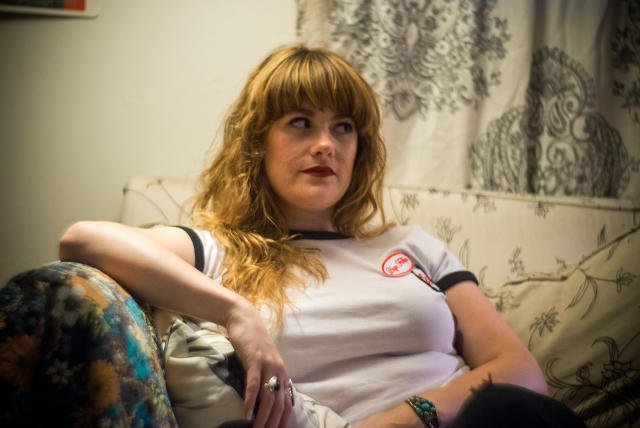How Women Are Swiping The Weirdness Out Of Online Dating
At first glance, Nathan seemed damn near perfect. At least, as far as one can tell from Tinder: He was a coffee-loving “urban adventurer” from the Midwest and an entrepreneur who walked dogs on the side. Oh, and get this: a self-described feminist. Finally, a guy that gets it. So when Nathan (not his real name) matched with Alexandra Tweten, a 28-year-old woman living in Los Angeles, she was eager to start chatting. The similarities just kept piling up. Like her, he loved beer, tattoos, and pizza. In his free time, he could be found digging through all the right vinyl genres: indie rock, shoegaze, electronic, and new age. Jackpot.
“It could have been my exact profile,” says Tweten. “These are all interests of mine as well.”
Surely, the universe was somehow trolling her. But this apparent dreamboat was real. And refreshingly, he had date ideas that extended beyond the default meet-up at a bar. Perhaps they could go for a nighttime drive around Beverly Hills, or make cocktails and listen to records. Enticed by the possibilities, she mulled over her next move. Then her phone rang.
“Who do you think you are!?” shouted the voice on the other end. “I was trying to explain something and you cut me off!” Unable to get a word in, Tweten winced at the angry, nonsensical barrage until the caller stopped. Figuring it was a wrong number, she hung up.
The phone rang again. It was Nathan. He apologized, explaining that he had meant to call somebody else. Something about a business deal gone awry. She brushed it off, joking that, for a moment, she thought he might have been “a crazy person.” Apparently offended, he started berating her even more furiously. She hung up and dodged several more calls and texts before finally humoring him with a few minutes of her attention. Attempting to explain himself, Nathan recounted a recent encounter with a stranger: A dog he was walking had allegedly bitten the man, a heated argument ensued, and it escalated quickly.
“Finally, I snapped and head-butted him in the face,” he said. “I broke his nose. I’m on the run from the cops. So you can see why I’m pretty tense.” He told Tweten that she had insulted him earlier and asked for an apology. “You never know when someone is going to snap,” he said. Tweten did not apologize, but she did hang up, this time for good.
“This guy was unhinged,” she says, still trying to make sense of their disturbing exchange. “I’m relieved I hadn’t met up with him or told him identifying information about myself.”
As strange as her experience felt, Tweten realized after swapping stories with friends that it wasn’t that unusual: For many women, oddly aggressive, sometimes threatening interactions with men are an all-too-familiar feature of Internet dating. The misconduct comes in a range of forms: Sometimes, a conversation on OKCupid, Tinder, or another service starts off overly offensive or aggressive, or turns hostile when the woman doesn’t respond favorably or quickly enough. Quite often, a sexually explicit photo arrives out of the blue. At its worst, the weirdness escalates into a barrage of insults or threats, and in some cases, physical violence. It’s now almost practically expected: Online dating can turn very weird very quickly.
“I think of it as a continuation of the harassment that women see every day in public and on the streets,” says Tweten. “It’s like being catcalled. It’s just more easily documented online.”
Disgusted by her own experience and others, Tweten began collecting these stories—told in the screenshots of online chats gone awry—under an Instagram account called Bye Felipe. A gender-flipped play on the dismissive Internet-popular phrase “Bye Felicia,” the account—like Tinder Nightmares and others—operates as a curated clearing house of screenshots showcasing the very worst of online dating weirdness, from sudden hostility to unwanted dick picks. Shortly after its launch in October 2014, the account went viral and now boasts nearly half-a-million followers.
“Women are getting together in these online spaces and saying, ‘This fucked-up thing happened to me,’” says Tweten, recalling the private Facebook group for women in L.A. where the idea for Bye Felipe was born. “All of these other women are saying ‘Yeah, that happened to me too!’”
Over the last three years, the use of Internet dating services has tripled among Americans aged 18-24, according to the Pew Research Center. With that surge has come an uptick in uncomfortable experiences, especially for women. A 2013 Pew study found that 42% of women reported being “contacted by someone through an online dating site or app in a way that made them feel harassed or uncomfortable.” Only 17% of men had the same complaint. According to another Pew survey conducted earlier this year, 53% of women who have used online dating apps believe that they are a more dangerous way of meeting people than traditional, offline means.
This perception of danger may not be unfounded. A recent report from the U.K.’s National Crime Agency (UKNCA) showed a sixfold increase in Internet dating-related sexual assaults in the U.K. between 2009 and 2014. (As that study points out, the general tendency for rape to be vastly underreported means that that number is likely lower than the reality.)
Of course, sexual assault is a worst-case—and thankfully, rare—outcome of the online dating experience. But for many women, the vulgar hostility they face in online spaces feels too close for comfort, especially in the context of location-based dating apps, when a face-to-face interaction with a stranger is just a few messages away.
Since its viral Instagram success, Bye Felipe has expanded into a cross-media feminist brand, complete with a podcast, anti-harassment petitions, and a live, Internet dating-themed comedy show in Los Angeles. Meanwhile, the screenshots keep pouring into Tweten’s inbox.
Clearly, Tweten has struck a nerve: The dark underbelly of online dating, particularly for women, is very real. But just as apps and hyper-connectivity seem to enable atrocious behavior, they can also used to expose and counteract it. Between startups designing more female-friendly dating apps and various forms of cyber-activism, entrepreneurs and Internet vigilantes alike are aiming to clean up Internet dating and perhaps improve offline behavior as well.
Why is Online Dating Such A Creepfest?
Online harassment isn’t a new phenomenon, but it does seem to be supercharged by the explosion of mobile dating apps. This isn’t the first time that technology has advanced more quickly than society can adapt. Similar forces slashed the music industry in half. Social networks changed news, activism, and privacy before anybody knew what happened. Just as Uber is rewiring transportation (or insert your disruptive tech example of choice here), dating apps are rapidly rewiring romance and sexuality. These shifts almost always come with some kind of fallout. But navigating cities is one thing; Navigating intimacy and human emotion is quite another. It’s no wonder things can get so uncomfortable.
To some, we’re living through a “dating apocalypse” defined by a rampant, emotionless hookup culture. To others, we’re living at an exciting moment in evolutionary history, as evidenced by the one third of marriages that are reported to have started online. Indeed, the 2016 Pew report on online dating showed that 80% of Internet daters think it’s a good way to meet people.
So why do nearly half of female online daters experience some kind of unwanted contact? There’s no simple answer, but several forces appear to be converging here: Some technological, like the ubiquity of smartphones, geolocation, social media, and anonymity. And some societal and psychological, like narcissism, insecurity, entrenched misogyny, and dating rituals and attitudes that go back centuries.
“The norms regarding online dating interactions are very much still being negotiated,” says Jessica Carbino, an on-staff sociologist at Tinder. “We don’t know what exactly the proper etiquette is yet.”
But people like Carbino, whose job is to study user behavior and understand the broader sociological impact of online dating, are starting to learn. “We do know that when individuals are removed from interactions where they’re in the presence of others, they may act differently—sometimes more boldly given the relative lack of social accountability,” says Carbino. But, as she’s quick to point out, the same has always been true in the offline world. Apps like Tinder, she notes, provide people “with a way to have a larger degree of contact” with that world.
In the UKNCA report into sexual assault resulting from online dating, researchers determined that more than half of assaults happened on dates that were preceded by some form of sexual communication, and that partial anonymity and the impersonal nature of online chatter “allows a person to behave in a way that they may not behave face-to-face.” They noted that “offenders have increased expectations of sexual activity” when they meet up for a date and that “these expectations differed from those of the victim.” The study also found that the investment of time and money led to “increased expectation of sex and rapid escalation of the relationship” among some men.
Of course, sexy talk isn’t the same as consent, nor does buying dinner come with a free ticket into someone’s bedroom. Perceptions like this predate the typewriter, let alone GPS-powered mobile apps, so it’s hard to argue that technology is the sole problem. Indeed, it may well be that there is a fundamental disconnect in expectations between many men and women and that technology has put a magnifying glass over it and let it simmer. But at the same time, the pressure to weed out the creepiness is heating up as well.
How Tinder Is Trying To Shed Its “Hookup” Stigma
While the weirdness factor is by no means unique to Tinder, the company’s early reputation as a hookup app has made it an easy target for sites like Tinder Nightmares (now available as a coffee table book) and Bye Felipe. But armed with data about how its users behave, Tinder is trying to shake that stigma.
Tinder has always tried to discourage bad behavior and what Carbino calls “undesired contact” through design. The app requires users to connect their accounts to Facebook to limit anonymity, offers simple abuse reporting tools (which can be used to call out offline behavior as well), and has a policy of banning repeat offenders. “Users who are offenders are reprimanded and [given] education about how to act in an inappropriate way,” she says. “If people continue to persist and act in a way that we don’t think is appropriate, we kick them off the app.”
Tinder tends to keep data about its usership private, and it declined to share statistics with Fast Company about how many abuse reports it receives from its estimated 50 million users. But Carbino insisted that Tinder isn’t the hotbed for bad behavior that it’s become known for. “The media really perpetuates these myths through these blogs. These blogs”—sites like Bye Felipe—”are not representative of Tinder.”
Tinder’s efforts to shed its ugly reputation include, most recently, Tinder Social, a new feature that aims to expand the app’s purpose into more platonic territory. Once unlocked, Tinder Social allows users to create friend groups within the app and use geolocation to find other groups of people to meet up with. The company has dabbled in other use cases—allowing people to “swipe the vote” through political preferences and match with a presidential candidate—but Tinder Social is by far the product’s most decisive step away from sex and dating.
Of course, reframing a product’s purpose after millions of people have started using it is no easy task. But just as Snapchat grew out of its reputation as a teen sexting app and into a social media phenomenon, Tinder has matured into a more mainstream service that people use for much more than sex. Citing internal user research, Carbino tells me that 80% of Tinder users are looking for relationships that are not purely sexual, whether they be friendships or romantic partnerships. Indeed, a casual swipe through the profiles of women on Tinder reveals a common request: No hook-ups, please. (You can read an interview with Carbino about Tinder user behavior here.)
The company’s male-dominated leadership and internal culture likely hasn’t made this evolution easier. In a January 2016 cover story on Tinder, Fast Company’s Austin Carr observed that “for a company that’s working to move beyond its bro-ish image, Tinder employs surprisingly few women” and that CEO Sean Rad—who returned to the position last year after a temporary ouster by the board—”often calls his female assistant into meetings” to get a woman’s perspective.
If the flood of submissions to sites like Bye Felipe and Tinder Nightmares are any indication, however, subtle, design-based efforts likely won’t be enough to get the creeps out of Internet dating. Carbino’s research and new features like Tinder Social can’t hurt, and they may result in a better experience—an obvious incentive for a company whose success depends on continued widespread use, not to mention the comfort of advertisers. But time may not be on the dating giant’s side.
A New Swarm Of Female-Friendly Dating Apps
As mainstream dating services attempt to dial back the weirdness, they face a new competitive pressure from a new crop of female-created apps designed to make the song-and-dance of digital courtship more friendly to women. The most well-known example is Bumble, a two-year-old app that sports the now familiar photo-centric, left-right swiping interface of modern dating apps, but adds features aimed at empowering women and ensuring conversations remain tasteful. Once a match is made, for instance, it’s up to the woman to start the conversation, which happens with 52% of matches, says cofounder Whitney Wolfe. If the conversation doesn’t start within 24 hours, the connection disappears. (The app also welcomes users from the LGBTQ community, and in those cases, allows either party to initiate a chat.)
“I wouldn’t say that dating apps are to blame for unwanted behavior,” says Wolfe, a former executive at Tinder who settled a sexual harassment lawsuit against the company and her former bosses in 2014. “If you treat women a certain way in the real world and if the product allows you to continue doing that, then you’re going to continue doing that.”
One major reason that online dating exchanges can turn sour, Wolfe says, is because men are often too conditioned to act as the aggressor and, in many cases, aren’t emotionally equipped to handle being rejected. “The chances of him getting rejected are so high, that it instills this defense mechanism,” says Wolfe. “If and when he’s rejected, sometimes aggression or uncomfortable behavior follows.”
As Bye Felipe and other creep-shaming sites illustrate, that defensive hostility can start bleeding through even before rejection happens. In many of Bye Felipe’s user-submitted posts, men can be seen fumbling their way past social norms and into an aggressive exchange that they somehow thought might lead them to sexual gratification. Often, that hope gives way to frustration and insults.

“The number one thing [men] always insult is their looks,” says Tweten. “You’re fat. You’re ugly. It’s such a tired pattern. Society tells women that your value is your looks. So that’s the first thing that they go after to try to make you feel bad about yourself.”
Wolfe acknowledges that technology does help amplify these behaviors, if only by increasing the number of people a person can interact with. “If you went on a date every single night just from meeting people at a bar or through mutual friends, the chances of having a negative experience would also rise,” she says.
Bumble’s goal is to enable this increase in one-to-one (or hey, whatever you’re into) connections while finding ways to minimize the risk of things getting uncomfortable. So far, it seems to be working: Amid the 25 billion swipes made on Bumble so far, says the company, 68% of matches have resulted in conversations. On an average day, 350,000 women start conversations. And although the app has amassed 7 million users as of July 2016, Bumble has only received a total of 800 abuse reports since its launch two years ago, according to Wolfe. In the last three months alone, Bumble’s daily active users have grown by 35%, she says.
Bumble’s success may be partially self-fulfilling: Creeps and trolls probably aren’t going to flock to a product that explicitly tries to design itself around them, or that aims to empower women, for that matter. Wolfe also credits seemingly minor design choices—from the app’s color palette to its inclusion of one’s occupation in each profile—with helping to make Bumble feel like a friendlier place. Crucially, photos sent within the Bumble app are watermarked with the user’s name to discourage, uh, undesired imagery.
Another feature, BumbleBFF, is intended to enable platonic friendships, a model that Tinder’s newer Social feature seems intent on replicating. Over 90% of users have tried BFF mode, says Wolfe, including many men. Most recently, Bumble even inched toward LinkedIn territory with the announcement of BumbleBizz, a feature for making professional connections.
Bumble leads a growing selection of alternative dating apps designed for women, usually by women. Coffee Meets Bagel, Siren, and Her (formerly Dattch) all take their own stab at making Internet dating a safer, more civilized experience overall. The Grade is an app that gives a letter grade to each user based on their likability and conduct on the service, including their responsiveness, civility, and even grammar. People who receive an “F” on The Grade are automatically banned.
It being the future and all, engineers are even throwing artificial intelligence at the Internet dating weirdness problem. The creators of Burner, an app that lets people route their phones and texts through a fake, throw-away number, recently launched a feature called Ghostbot. Once enabled, it quarantines unwanted suitors (or anybody else) off into a dead-end conversation with a noncommittal chatbot. If you’re curious, you can always peak at Ghostbot’s conversations, which isn’t an option when you’ve simply blocked somebody’s number from contacting you all together. Tweten, who tested Ghostbot early on with real sample messages from Bye Felipe, likes that it lets users monitor potentially threatening messages without getting fully roped into them. “It’s something I wish I would have had in the situation where that guy yelled at me over the phone,” she says.
Even IBM’s Watson is getting in on the matchmaking game. Connectidy is an app that taps Watson’s AI technology to analyze its users’ personalities based on their social media presence and other data and then match people accordingly. The app “uses cognitive computing to deliver objective personality insights and cultivate emotional intelligence,” and relies on Watson’s “tone analysis” algorithm to help users craft appropriate, effective messages as they’re typing. It may sound a little cold and futuristic, but it’s one more crack being taken at a pervasive problem.
If nothing else, this flood of alternative dating apps and new features could have the longterm effect of helping to make Internet dating more friendly to women. “I’m not in this to take over the market,” says Wolfe. “I really just want to make a difference in the way women like myself feel when they date. If other apps make their apps more female friendly, that’s fantastic.”
The Rise Of Public Shaming As Activism
Last month, Bumble took its fight to a new level: It borrowed a page from the creep-shaming playbook with an open letter to a user who was reported for going on a sexist tirade after he matched with a woman, whose innocuous small talk about work apparently struck a nerve. The public shaming of online harassers is common practice for renegade Instagrammers and bloggers, but it’s uncharted territory for venture-backed technology startups. Whatever the long-term effectiveness of shaming may be, Bumble’s move offers a new level of legitimacy to something that many women were already doing on their own.
Emily Sears is no stranger to unsolicited dick pics. The 31-year-old model received them so routinely on Instagram, Twitter, and Facebook that she decided to start responding—but not how the senders may have hoped. One by one, she tracked down the wives, girlfriends, and mothers of each offender and sent them screenshots of what she had received. In her own more direct and private way, Sears—who happens to be a member of the same L.A. women’s Facebook group that spawned Bye Felipe—did what others are doing publicly: humiliate people who sexually harass others online. If anonymity is indeed part of the problem, one solution may be to remove that shroud completely.
“That’s why I started Bye Felipe,” says Tweten. “To take that power back from these terrible people who are just insulting women and to flip it around.”
If the efforts of entrepreneurs and engineers at companies like Bumble, Tinder, and Coffee Meets Bagel wind up reshaping the online dating dynamic, they won’t do it alone: Women like Sears and Tweten, empowered by social media and untethered to the slow crawl of product development that burdens technology companies, are taking matters into their own hands and briskly firing back.
“Public shaming is a powerful tool,” says Tweten. “I think that people who do these terrible things deserve to face repercussions. Before the Internet, these guys would just get away with it and keep doing it.”
While this approach isn’t without its potential ethical pitfalls, the logic is clear-cut: If you’re going to expose yourselves to us—junk and all—we’re going to fire back by cranking the exposure dial up a notch.
With her friend Eileen Beard, Tweten has been cranking that dial, with a Bye Felipe-branded podcast about the horrors of online dating, as well as a more activist volley: In June, she launched a Change.org petition demanding an end to unsolicited dick pics, first by calling on Facebook to more explicitly ban the practice in its community guidelines. These unwanted images, the campaign argues, are the equivalent of somebody exposing themselves to somebody on the street, and ought to be treated accordingly. She’s also writing a book about the dark side of Internet dating and online harassment.
The effectiveness of creep-shaming has yet to determined, if it’s even possible to measure it. Some of the early results aren’t promising: Tweten gets some pretty horrifying comments under her Instagram posts, and her anti-dick pic petition has led to a surge of—you guessed it—unsolicited dick pics in her inbox. One man messaged her with what started as a declaration of support, but went on to explain that sometimes, women are essentially asking for it. After reading the Fast Company story about Tweten’s petition, he was perturbed by her use of foul language in the article, noting that “men assume [bad language] is a green light for bad behavior.”
It’s early still, but it’s not hard to imagine how our unprecedented capacity to communicate and band together online could help disrupt online misogyny and harassment. Earlier this year, social media helped a group of women take down an L.A. music publicist who was accused of rampant sexual harassment. And it’s not the only example of women breaking their silence and striking back at the infamous misogyny of the music industry. Meanwhile, the decade-old case against Bill Cosby was reignited—and later expanded—by a clip of fellow comedian Hannibal Burress calling him a rapist in 2014. Cosby is now awaiting a trial date on sexual assault charges. Increasingly, online spaces like Instagram and private Facebook groups are allowing women to congregate, share stories, and organize around the issue of harassment in online dating and social media.
For Bye Felipe, Instagram and Change.org are just the beginning. In mid-July, Tweten organized a feminist comedy show at The Virgil in L.A. that also served as a live taping of the Bye Felipe podcast. On stage, Tweten and her cohost Eileen Beard interviewed Sabrina Cognata and Whitney Bell, two artists who have turned their awful online experiences into provocative masterpieces: Cognata’s Dickcoupage project plasters the unwanted, pixellated phalluses she’s received all over a coffee table, while Bell’s recent art show, “I Didn’t Ask For This: A Lifetime Of Dick Pics,” placed such photos on display in a much more prominent fashion than their creators ever intended.
After the podcast recording, five female standup comedians took to the stage for a kind of feminist show-and-tell of some of the unsolicited dick pics they had received, as each image was projected onto a large screen behind them. The variety show wasn’t just a hilarious expression of outrage: The two-hour affair left the mostly female audience in East Hollywood laughing in knowing solidarity with one another and leaving little doubt: Tweten is onto something.
Of course, there are risks to the creep-shaming approach. In the lightnin- fast cycle of social media virality, it’s possible that a post could wind up doing outsized damage to someone’s reputation or, worse, bring humiliation to the wrong person entirely.
“There’s the witch-hunt thing, which I think is bad,” says Penelope Gazin, an artist and illustrator who intermittently runs an Instagram account called TindrWeirdo. “There have been some situations where I’ve been like, ‘Hmm, that’s not a black and white situation. I feel like this person should have gone to the police rather than posting this on the Internet.’ Sometimes people are crazy and they lie.”
Tweten says she takes things like this into account and tries to be “very selective in shaming people who deserve to be shamed.” In a few cases she has taken down Bye Felipe posts when implored by people who insist their account was hacked.
On TindrWeirdo, Gazin takes the spirit of Bye Felipe and injects it with her own twisted sense of humor. In some cases, her would-be suitors are not even being inappropriate. But in each screenshot, you can see Gazin rotate the weirdness cannon back around toward the male online dating population and fire indiscriminately at the mob with an onslaught of foul jokes and trolling. Indeed, as you scroll through her frequently hilarious posts, you start to wonder who the weirdo is.
Like Tweten and so many others, Gazin has had exchanges with men that have become hostile for no apparent reason, including one with a college professor with whom she had already gone on a date. But while she acknowledges that online dating can turn scary, she encourages women to counteract the nastiness—whether through exposure, humor, or other means—without taking the whole thing too seriously. “These are the same people that go on racist tirades on YouTube videos about kittens,” she says. “Who cares? You have to recognize that people are often saying those things out of self-hatred. You can’t get too upset. You just have to be like, ‘That’s nice’ and pat them on the head.”
Alexandra Tweten started the Bye Felipe Instagram account to expose harassment in online dating. It has since expanded into a podcast and live comedy show.

Former Tinder executive Whitney Wolfe founded Bumble, an alternative dating app that aims to empower women and make Internet dating more civilized.

Jessica Carbino is Tinder’s on-staff sociologist. The norms of online dating “are still very much being negotiated,” she says.

Fast Company , Read Full Story
(71)












